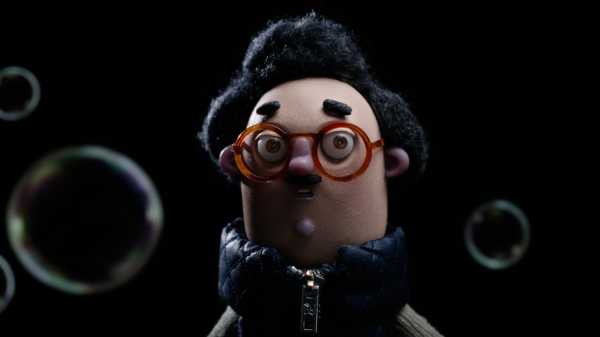
The rapport of the married voice actors Julian Barratt and Julia Davis helps dramatize the power struggle they perform.
Daniel Robert Hope is skeptical by nature. The filmmaker and animator remembers reading “A Sighting,” a couple of years ago, a poem by Joe Dunthorne in which an unnamed narrator encounters a bear in the forest and senses the animal is a man in bear’s clothing. Hope detected an omission. “What are they trying to cover up? What happened in the woods?” Imagining what circumstances could lead to the scene in the poem was the basis for his new animated short, “The Clearing.”
The darkly comedic film follows a middle-aged suburban dad named Bill on a camping fishing trip. He is “a survivalist” and “a family man,” as he says of himself in the opening scene. But this overly confident narrator is “not what he thinks he is,” Hope told me. The filmmaker, who recently turned forty-four, joked about the nagging sense of deficiency, or perhaps transformation, that can come with age. “We’re all becoming our parents, for God’s sake,” he said, laughing. “I wanted to bring that into Bill.”
Bill is a bit frumpy, even for a puppet dad, with bushy hair and a bulbous chin, but he sees himself as something of a ladies’ man—“A man like myself, you get offers,” he explains, in voice-over. He has had an affair, or two, and he’s trying to regain the respect of his wife, Deb. To make matters stranger, Bill keeps envisioning his lover as a femme fatale with fins.
While Bill drives his family into the woods, he daydreams. Breathy female vocals echo in his head as the image of a silvery fish in a wedding gown appears in his mind. “Fish,” he murmurs. “Did you just say ‘fish’?” Deb asks. They arrive at the campsite and find a bear-warning sign at the edge of the woods. “Poppycock,” he says. “Some simple beast can’t take what’s mine. I’m always guarding you,” he tells Deb, flaunting his Swiss Army knife. She is unimpressed.
The playful rapport of the married voice actors Julian Barratt and Julia Davis helps dramatize the power struggle between Bill and Deb, and Bill’s libidinal distress registers in the short’s mix of mundane and surreal stop-motion animation. Cartoonish beads of sweat trickle fitfully down his forehead. Fish waddle and coo by the creek where he fetches water. Even the physical materials that Hope uses blend man and animal. His puppets wear outfits made out of thrifted clothes. Grass is made of fake fur, clouds wool.
As in the poem, whether or not Bill’s lover is actually a beast is beside the point—the question itself is far more interesting. In an earlier version of the short, Bill’s lover was a miniature woman, but Hope wanted his audience to be disturbed. “Bill has this deluded idea of who he is,” he said. “He’s not edgy. The only edgy thing is that he’s a liar.” In one scene, Bill takes the family fishing. Creekside, he tugs the fishing rod out of his son’s hands, eager to confer some fatherly advice. But it’s Deb who catches one. She and their son head back to camp. Bill gazes at the nude creature wriggling seductively in the net. “I can’t now, she’s onto us,” he whispers, pained lust shaking his voice. He blows a kiss before gathering himself to bring Deb the fish, which she dangles in front of him before decapitating for dinner. “Happy to provide,” Bill says afterward.
Sourse: newyorker.com